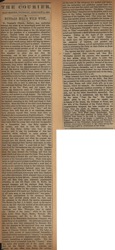
BUFFALO BILL'S WILD WEST.
St. Clement's Church, Salford, was, yesterday evening, the scene of an exceedingly novel and interesting gathering. The baptism of the papoose which was born in the Indian camp on the 8th instant took place in the presence of a congregation altogether unique. English ladies and gentlemen, American cowboys, Mexican vaqueros, and Indians assembled for the purpose of witnessing the ceremony. It was indeed a sight worth seeing, and it will long be remembered by all who were privileged to attend. There was no desire or intention on the part of the management that the event should partake at all of the character of a public ceremonial; rather the reverse. But somehow or other the fact that the christening was to take place at a particular Church, and at a certain time, got abroad in the neighbourhood, and the consequence was that the approaches to the sacred building were surrounded by sightseers, long before the doors were opened, and when the hour for the commencement of the service arrived the interior was filled, excepting a number of seats in the centre, which were reserved for the members of Colonel Cody's company, and a few ladies and gentlemen who had been specially invited to attend. The baby, it will be remembered, is the daughter of Little Chief, of the Ogallala tribe of the Sioux nation. Little Chief, who is next in authority to Red Shirt, the celebrated fighting chief, is a fine specimen of the natives of the Far West, and his squaw, who enjoys the distinctive name of "Good Robe," is really a handsome woman—strongly-built, intelligent-looking, and modest in a high degree. The father and mother are both members of the Episcopalian Church, and they naturally desired that their offspring should be baptised according to the faith and ritual of their adoption. Since the birth of the child much discussion has taken place in the camp as to the question of her nationality; and while some of the "boys" and the Indians have held that she is an American, others have strongly argued that, having been born in England, she is necessarily an English subject. "Outsiders," who have been permitted to express an opinion upon the matter, have adopted the latter view, and they insist that the young lady must ever be regarded as a Lancashire lass. One thing appears to be certain, and that is that the little one is the first Sioux Indian ever born in this country, and it was the knowledge of this fact doubtless which induced so many persons to attend the ceremony of last night. The feeling of interest was very great, and when the papoose was brought into the church, many of the ladies could hardly by restrained from leaving their seats, in order that they might have "a good look at her." The time fixed for the ceremony was six o'clock. Shortly before that hour the majority of the Indians from the camp entered the building, and took the seats which had been set apart for them. They marched from the camp in double file, and were escorted by a number of the borough police force. There were some seven or eight squaws present in addition to the mother of the child, and one of them attracted a good deal of notice as she carried an infant in the orthodox Indian style in a contrivance fastened upon her back. Red Shirt, and Little Chief were in "full dress," and they looked strikingly picturesque with their feathers and other adornments, which stamped them at once as being superior to their fellows. Colonel Cody (Buffalo Bill) and Miss Cody [1] also attracted considerable attention, as also did Major John M. Burke, the general manager, and the stalwart Buck Taylor, the King of the Cowboys. The Indians had their best blankets on specially for the occasion; some of them were decorated with beads and feathers, and the faces of all were more or less streaked with "war paint." The chief participators in the ceremony having taken their allotted places round the font near the entrance to the church the service commenced. The Rector (the Rev. J. J. Scott), [2] stood in the centre, and on his left were the mother of the child and two other squaws, the godmother, Mrs. A. M. H. Gardiner, and Mrs. Whittaker, who is styled the "Mother of the Camp," while to his right were Little Chief, Major Burke, Broncho Bill, the interpreter, and Mr. A. M. H. Gardiner, manager of the Manchester Racecourse Company, who acted the part of godfather. The principal portions of the service were duly interpreted by Broncho Bill, and the papoose at the appointed time was handed to the Rector, who baptised her, giving her the name of Frances Victoria Alexandra. The baby—a plump little morsel of copper-coloured humanity—was comfortably ensconced in a "bonnet—a covering consisting of buckskin ornamented with beads, and closely resembling a miniature cradle. Not the slightest sound proceeded from the "bonnet" when the water was poured out of the small silver dish by the Rector upon the papoose, nor indeed, at any other time during the service. At the close of the ceremony the mother and father and the godmother and godfather passed down the aisle to a seat near the pulpit, and then followed a very striking and interesting feature. The hymn, "Nearer my God to Thee," was given out by the rector, and it was sung in the Indian language by a number of the members of the Ogallala band. One voice was heard first, then another joined, and gradually the volume of sound increased, and above the somewhat husky sounds which proceeded from the males could be heard the shrill and by no means unmusical voices of the females. "Mita Wakantanka Nikiyena"—that is, "Nearer, my God, to Thee"—concluded, the rector ascended the pulpit and delivered a short address appropriate to the occasion. Taking as the basis of his remarks the first two words of the Lord's Prayer, he dwelt upon the importance and solemnity of the ceremony of baptism, and pointed out that Americans, Indians, and all nationalities could all unite in addressing the Deity as their Father as those present had done that night.
The register was duly signed, the parents making a "mark" opposite their names, and then Mrs. Whittaker carried the papoose, who appeared to be fast asleep, along the aisles in order that the desire to see the little one, which was as strong as it was general, might be gratified. Several of the more impressionable ladies present insisted upon kissing Frances Victoria Alexandra, and it was with no little difficulty that the nurse pushed her way through the throng. The Indians then marched back to the camp, and the parents returned in a cab.
Many presents have been made by the Indians and the cowboys to the parents for the child. Red Shirt has presented her with a pony, and Eagle Heart, Little Bull, Blue Horse, and other chiefs will, as is customary, follow his example. Mr. Gardiner has given her a very handsome necklace consisting of English coins of different periods, plated with gold on the one side, and on the other beautifully enameled. The Indians will, it is understood, call the little one by the name "Over the Sea." The English names given to her, it may be stated, are in honour of the Queen, the Princess of Wales, [3] and the wife of the President of the United States. [4] A congratulatory telegram has been received at the camp from the chiefs in Dakota. It runs as follows:—"Pine Ridge, Indian Agency, Dakota. To Colonel Cody, Wild West Camp, Manchester. Red Cloud and chiefs send greeting to Little Chief. An English born Sioux is an item in Ogallala history. The great ocean is no longer a tradition to them. Signed, Gallagher, the Indian agent, and Robinson, missionary of the Protestant Episcopalian Church." Further rejoicings took place in the camp among the Indians last night in celebration of the event.
Note 1: Arta Lucille Cody (Dec 16, 1866-Jan 30, 1904), the eldest daughter of Louisa and William F. Cody, sailed by herself to England in 1887 to join her father during Buffalo Bill's Wild West's first tour abroad. [back]
Note 2: Reverend Joseph John Scott was rector of the parish of St. Clement's Church, a Protestant Episcopal Church in Salford, Manchester, England. [back]
Note 3: The Princess of Wales was Princess Alexandra of Denmark (Alexandra Caroline Marie Charlotte Louise Julia; 1844-1925) and later Queen Alexandra, consort to Edward VII, King of Great Britain, 1844-1925. [back]
Note 4: Frances Folsom Cleveland (1864-1947) married President Grover Cleveland (1837-1908) in 1886 during his first presidential term, becoming the 23rd First Lady of the United States at the age of 21; she remains the youngest First Lady in history. [back]
Title: Buffalo Bill's Wild West
Periodical: The Courier
Source: McCracken Research Library, Buffalo Bill Center of the West , MS6.3679.13.02 (Stroebel scrapbook)
Date: February 16, 1888
Topics: Lakota Performers
Keywords: American Indians Baptism Church Cowboys Hymns Indian agents Indian beadwork Indian children Indian women Indians of North America--Clothing Infant baptism Mexicans Oglala Indians Sioux Nation Translators
People: Alexandra, Queen, consort of Edward VII, King of Great Britain, 1844-1925 Cleveland, Frances Folsom, 1864-1947 Little Chief, b. 1851 Red Cloud, 1822-1909 Red Shirt, 1845?-1925
Places: Lancashire (England) Manchester (England) Pine Ridge Indian Reservation (S.D.)
Sponsor: This project is supported in part by a grant from the National Endowment for the Humanities and the Geraldine W. & Robert J. Dellenback Foundation.
Editorial Statement | Conditions of Use
TEI encoded XML: View wfc.nsp11560.xml
Back to top
